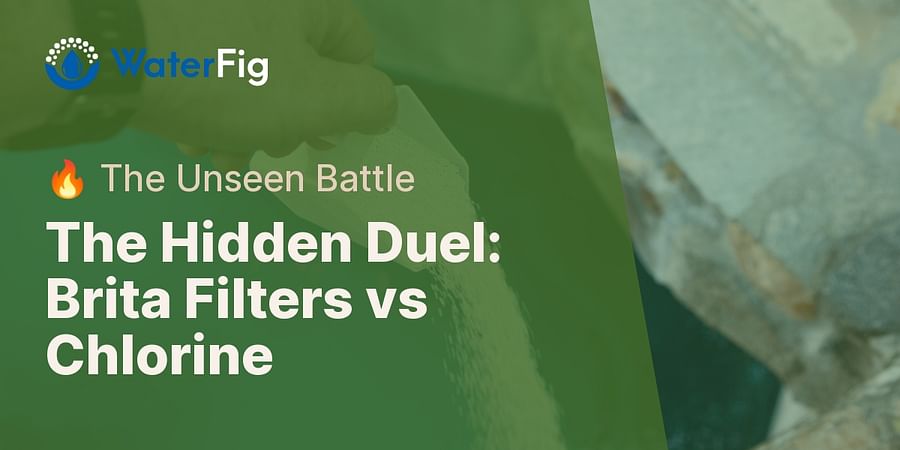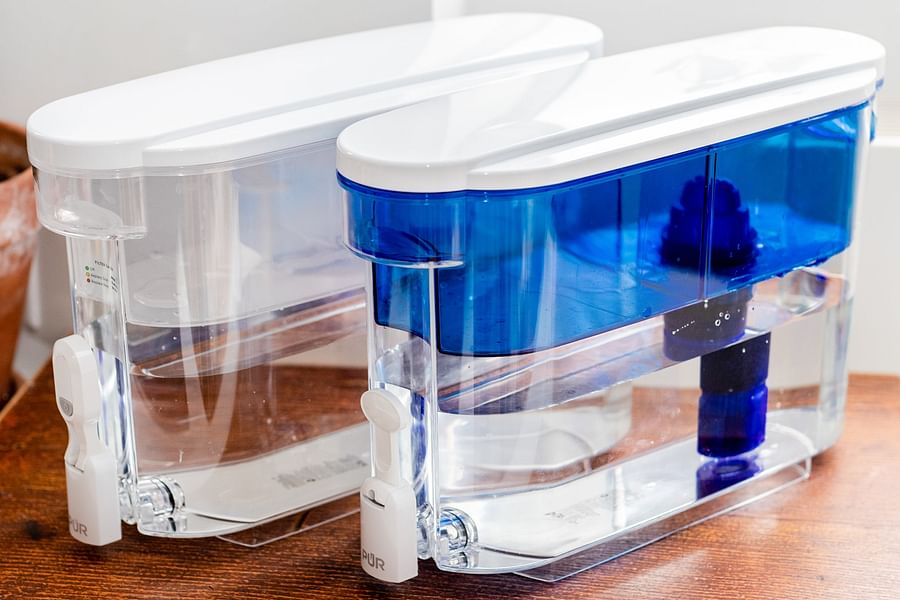Brita Filters vs Chlorine: The Unseen Battle

Imagine a boxing ring where the contenders are invisible. In one corner, we have Brita Filters, the crowd's favorite, a hero that promises to rid your tap water of unwanted elements. In the other corner, we have Chlorine, the unsung hero of water treatment, silently battling harmful bacteria to keep our water safe.
Let's dive into Brita filters and Chlorine in tap water.
Before we get to the main event, it's crucial to understand the players. Brita filters, often hailed in water filtration product reviews, are designed to reduce certain contaminants in your water, including Chlorine.
Yes and no. While Chlorine is crucial in water treatment, it's a double-edged sword. Curious? Stick around as we uncover the truth in this Brita filters vs. chlorine showdown.

How does your Brita filters magically transform tap water into a clear, refreshing drink?
Thanks to a dynamic duo: activated carbon and ion-exchange resin. Like a diligent detective, the activated carbon snares the chlorine molecules and other impurities in the water, removing any unpleasant taste and odor.
Meanwhile, the ion-exchange resin, a true unsung hero, is working hard. It's busy swapping the chlorine ions in the water with harmless ions, effectively neutralizing the chlorine. This process, reverse osmosis, is a vital part of the Brita filtration system.
Savoring a glass of Brita-filtered water,
So, next time you're savoring a glass of Brita-filtered water, remember the hard-working team of activated carbon and ion-exchange resin. They're the stars of this best undercounter water filtration system, ensuring every drop you drink is clean and pure.
Now that we understand the role of activated carbon and ion-exchange resin in a Brita filter, let's visualize the process. Here's a step-by-step journey of a water molecule as it travels through a Brita filter.
Learn more about 🚰 A Water Molecule's Journey Through a Brita Filter or discover other Water Fig guides.
That's the journey of a water molecule through a Brita filter. Now, let's shift our focus to the impact of chlorine in tap water.
Chlorine, the unsung hero of our tap water, plays a vital role in maintaining its safety. It's like a diligent lifeguard, constantly on the lookout, eliminating harmful bacteria and viruses that may lurk in our water supply. However, like a lifeguard who's overzealous with their whistle, chlorine can sometimes be a tad too much, leaving a residual taste and odor that many find unpleasant.
Chlorine levels
Moreover, prolonged exposure to high chlorine levels can lead to certain health issues, such as skin and eye irritation. Yet, without chlorine, our tap water could become a breeding ground for disease-causing microorganisms. It's a classic case of a double-edged sword.
But what if you could have the best of both worlds - safe, clean water without the taste and potential risks of chlorine? Enter Brita filters, a popular choice among the best water filtration systems on the market.

After understanding the role of chlorine in water treatment, let's look at its pros and cons in a tabulated form. This will give us a clearer perspective before we compare it with Brita filters.
| Pros of Chlorine | Cons of Chlorine |
|---|---|
| Effective in killing bacteria and viruses | Can impact the taste and smell of water |
| Helps in preventing waterborne diseases | Long-term exposure can lead to health risks |
| Cost-effective method of water treatment | Not effective against certain types of parasites |
| Keeps water safe for a long period | Can react with organic matter to form harmful by-products |
Now that we comprehensively understand chlorine's role in water treatment let's compare it with Brita filters.

Stepping onto the battlefield of water purification, we have two strong contenders:
Brita Filters and Chlorine.
Brita filters, the gladiators of the water world, use a combination of activated carbon and ion exchange resin to produce crystal-clear, tasty water. They're the underdogs and rebels who say no to the status quo.
On the other side, we have Chlorine, the old guard. It's been in the game for over a century, disinfecting our tap water with an iron fist.
Who wins this unseen battle?
Is the innovative Brita filter championing taste and health, or the robust Chlorine standing firm on cost-effectiveness and wide-scale usability? And what about the best undercounter water filtration system or the latest in water filtration products?
The answers are more nuanced than you might think. So, grab your water bottles, folks. This is going to be an enlightening ride!
Test your knowledge on what you've learnt from the comparison of Brita filters and chlorine treated water.
Learn more about 🔬 Brita Filters vs Chlorine: The Unseen Battle Quiz or discover other Water Fig quizzes.
Now that we've covered the basics of Brita filters and chlorine, let's dive into some of the most frequently asked questions about these two water treatment methods.
We hope these FAQs have helped clarify the Brita Filters vs. Chlorine debate. Remember, the best choice depends on your specific needs and preferences. Let's conclude with some final thoughts.
And there we have it! Our journey through the uncharted waters of Brita filters and chlorine has been fascinating.
We've navigated through everything from the intricate workings of a household water filtration system to the decisive battle of Brita filters vs. chlorine.
Now, my dear readers, the ball is in your court.
As you ponder, remember this - water is life's elixir, and ensuring its purity is not just a choice but a lifestyle.
Until our next deep dive, keep sipping, exploring, and always questioning. Here's to clear, refreshing, and healthy waters ahead! Cheers!
After diving deep into the world of Brita filters and chlorine-treated water, we'd love to know your preference. Do you prefer the crisp taste of Brita-filtered water, or do you trust the tried-and-true method of chlorine treatment? Share your choice!
Post a comment